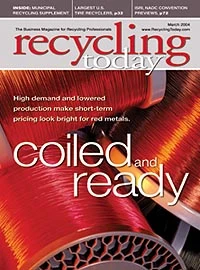Residential recycling program developers generally agree that instilling the habit of recycling into the mind of each person can go a long way toward keeping participation rates high. "Taking out the garbage" is a way of life. The job of recycling coordinators is to make "Taking out the recyclables" grow to have that same familiar ring.
Unfortunately, in some U.S. cities such habitual routines can crumble if programs become inconsistent, or if budget cuts lead to the disappearance of media messages that encourage residents to recycle.
In Ann Arbor, Mich., the staff of Recycle Ann Arbor (RAA), led by Executive Director Melinda Uerling, continues to counter the trend toward reduced attention to recycling by keeping programs and recycling options in front of the city’s 114,000 residents.
STAYING ON THE SCENE. Non-profit organization Recycle Ann Arbor traces its roots back to 1977 as a neighborhood group of volunteers who wanted to provide community recycling programs (including curbside pickup) to residents.
The group’s early efforts involved collecting newspapers and containers in 50-gallon containers that were loaded onto flatbed trucks. The organization grew geographically and in sophistication, opening a materials recovery facility (MRF) in 1987 adjacent to the Ann Arbor landfill.
Although RAA was replaced by a private contactor for MRF operations in 1996 (the FCR division of Casella Waste Systems is currently processing what RAA collects), it has continued to manage curbside collection and to offer additional recycling opportunities to residents.
Recycle Ann Arbor will continue with those activities in the foreseeable future, having recently signed a 10-year contract with the City of Ann Arbor to provide curbside collection and special events recycling services, such as organizing electronics recycling events.
| Recycle Ann Arbor at a Glance |
|
No. of Employees: 34 Locations: Drop-off Station and The ReUse Center Services Provided: Weekly curbside pick-up for single-unit and some multi-unit residences in Ann Arbor; regional drop-off center to collect recyclables from residents not served at curbside; and ReUse Center offering used appliances, fixtures, building materials and other durable goods. Tonnage Handled: 11,000 tpy picked up at curbside; 6,500 tpy gathered at drop-off center (total does not include ReUse Center items) Commodities Collected at Curbside: ONP, OMG, mixed paper, phone books, paper bags, OCC, boxboard, glass, #1 and #2 plastic containers, aluminum and steel cans, aseptic juice boxes and milk cartons, aerosol cans, aluminum foil and residential scrap metals. |
Uerling considers the new contract an important factor in RAA’s future. "Negotiating the stability of a long-term curbside contract has been a strategic goal for RAA for many years," she comments. "Now that we find ourselves on the other side of it, we’re thinking much bigger," she says, citing an increased attention to construction and demolition (C&D) materials and the possibility of extending curbside service beyond Ann Arbor’s city limits into neighboring townships.
She says the new 10-year contract (which contains two five-year extension options that can be agreed to by both sides) should allow RAA to focus on these additional priorities.
HOT TOPICS. Although Ann Arbor is fortunate to have community commitment to its curbside program, this does not mean the city can escape being buffeted by the national and global forces affecting the recycling industry.
Uerling is among the curbside recycling officials who questions the rapid shift to single-stream collection and processing, taking exception to the notion that switching to this method could mean that certain recyclables must be abandoned.
In Michigan, legislative progress has moved in fits and starts toward an expansion of the Wolverine State’s bottle bill to include non-carbonated beverage bottles.
Uerling says the organization sees no reason to rest upon its good reputation in the community. "Being a non-profit doesn’t preclude being successful—we operate our organization very much like a business," she states.
Get curated news on YOUR industry.
Enter your email to receive our newsletters.

Explore the March 2004 Issue
Check out more from this issue and find your next story to read.
Latest from Recycling Today
- Green Cubes unveils forklift battery line
- Rebar association points to trade turmoil
- LumiCup offers single-use plastic alternative
- European project yields recycled-content ABS
- ICM to host colocated events in Shanghai
- Astera runs into NIMBY concerns in Colorado
- ReMA opposes European efforts seeking export restrictions for recyclables
- Fresh Perspective: Raj Bagaria






